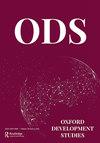Unsettled authority and humanitarian practice: reflections on local Iegitimacy from Sierra Leone’s borderlands
IF 1.2
Q3 DEVELOPMENT STUDIES
引用次数: 10
Abstract
ABSTRACT Calls to localise humanitarian practice and to engage communities in emergency responses have gained prominence in recent years. Using the case study of the response to the 2014–16 Ebola outbreak in Sierra Leone, this article probes into the assumptions underlying efforts to mobilise ‘community stakeholders’ to legitimise emergency measures, revealing how they envision authority within communities as static and independent of experiences of humanitarian intervention. Drawing inspiration from Raufu Mustapha’s intellectual legacy, it shows the limitations of these assumptions by paying attention to structural factors, historical legacies, and the empirical workings of power. Through an ethnographic account of how the Ebola response was experienced and remembered in a remote border town, the article proposes instead the concept of unsettled authority. Stories from these borderlands show how the legitimacy of local authority was dynamically negotiated, made and unmade, through encounters with humanitarian interventions as these became intertwined with longer-term contestations of power with unpredictable consequences.不安定的权威与人道主义实践:对塞拉利昂边境地区地方合法性的思考
近年来,呼吁将人道主义做法本地化并让社区参与应急响应的呼声越来越高。本文通过对塞拉利昂2014-2016年埃博拉疫情的应对案例研究,探讨了动员“社区利益相关者”使紧急措施合法化的基本假设,揭示了他们如何将社区内的权威视为静态的,独立于人道主义干预的经验。它从劳夫·穆斯塔法的思想遗产中汲取灵感,通过关注结构因素、历史遗产和权力的经验运作,展示了这些假设的局限性。通过对埃博拉疫情在一个偏远的边境小镇的经历和记忆的民族志描述,文章提出了不稳定权威的概念。来自这些边境地区的故事表明,地方当局的合法性是如何通过遭遇人道主义干预而动态谈判、制定和取消的,因为这些干预与长期的权力争夺交织在一起,产生了不可预测的后果。
本文章由计算机程序翻译,如有差异,请以英文原文为准。
求助全文
约1分钟内获得全文
求助全文
来源期刊

Oxford Development Studies
DEVELOPMENT STUDIES-
CiteScore
2.70
自引率
0.00%
发文量
20
期刊介绍:
Oxford Development Studies is a multidisciplinary academic journal aimed at the student, research and policy-making community, which provides a forum for rigorous and critical analysis of conventional theories and policy issues in all aspects of development, and aims to contribute to new approaches. It covers a number of disciplines related to development, including economics, history, politics, anthropology and sociology, and will publish quantitative papers as well as surveys of literature.
 求助内容:
求助内容: 应助结果提醒方式:
应助结果提醒方式:


